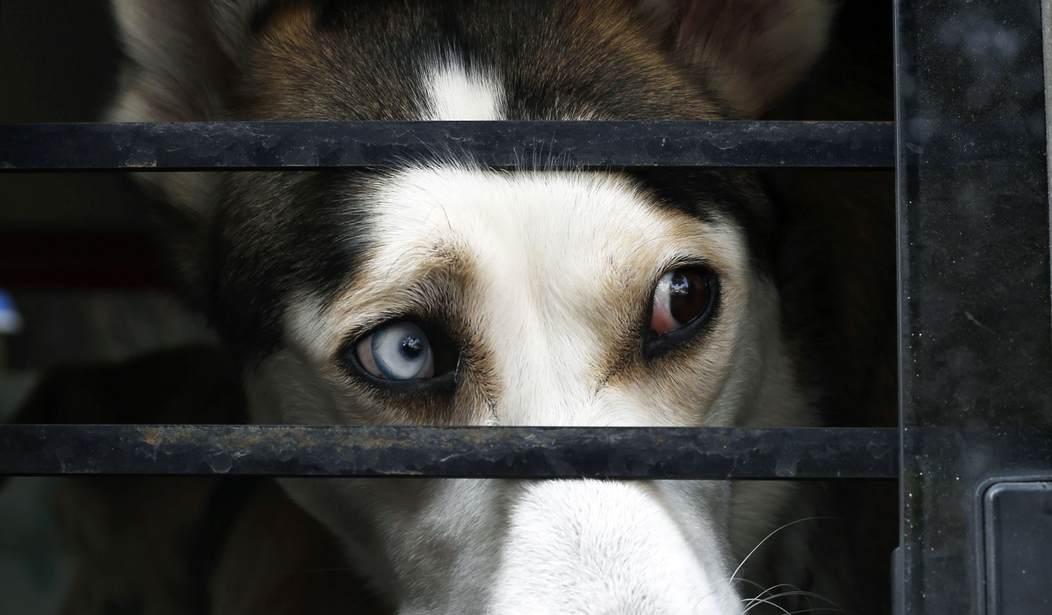I came across three seemingly unrelated stories today which may collectively tell a story about something bad happening in America. The stories are all about anxiety which seems to have peaked during the pandemic and never quite receded. One result of this general anxiety is than an increasing number of US dogs are now taking anti-anxity medication meant for humans.
Prozac prescriptions for dogs are on the rise, veterinarians across the country acknowledge, along with a myriad of cheaper generic mood stabilizers sold for humans but applied to pets’ separation anxiety, socialization fears, biting habits, or other problematic behavior.
The apparent mental health crisis in pets comes in the midst of a very clear human one. Americans’ depression and anxiety rates hit record highs during the pandemic and keep moving upwards. Prescriptions for mood stabilizers like Prozac and Zoloft surged during Covid-19 — on top of steady increases since the ’90s — sometimes triggering shortages of the medications...
“There’s so many similarities in people’s emotions towards their children and emotions towards their pets,” said Kogan. “We might be, for example, overly anxious about their well-being, just as a lot of people are about their children.”
The comparison between dogs and kids is an apt one because there's another opinion piece out today in which a psychiatrist from Boston University argues that anxious parents may need more help than their kids.
This month, across the country, a new cohort of students is being accepted into colleges. And, if recent trends continue, the start of the new school year will kick off another record-breaking season for anxiety on campus.
I’m talking about the parents. The kids are mostly fine...
The typical call from a parent begins like this: “I think my son/daughter is suffering from anxiety.” My typical reply is: “Anxiety in this setting is usually normal, because major life transitions like living away from home for the first time are commonly associated with elevated anxiety.” Parents used to be satisfied with this kind of answer, thanked me, hung up, called their children and encouraged them to think long-term: “This too shall pass.” And most everyone carried on.
But these days this kind of thinking just convinces parents that I don’t know what I’m talking about. In the circular logic of mental health awareness, a clinician’s reassurance that situational anxiety is most likely normal and time-limited leads a parent to believe that the clinician may be missing a serious mental health condition.
Today’s parents are suffering from anxiety about anxiety, which is actually much more serious than anxiety. It’s self-fulfilling and not easily soothed by logic or evidence, such as the knowledge that most everyone adjusts to college just fine.
The kids are mostly fine but the parents are freaking out. This psychiatrist says some parents even make appointments for their kids if they don't seem anxious enough.
There's really nothing explicit in either story that tells us anything specific about the parents (and dog owners) who are spreading their "anxiety about anxiety" to the people around them, but there are hints: "I worry that the current obsession with mental health awareness is disempowering parents from helping their adult children handle ordinary things." Who do you think the parents are who are treating their kids like special snowflakes incapable of handling any challenge?
I suspect Ross Douthat spelled this out in a separate column published Saturday titled "Can the Left Be Happy?"
The smartphone theory of increasing youth unhappiness has been especially in the news this past week, thanks to Jonathan Haidt’s new book, “The Anxious Generation: How the Great Rewiring of Childhood Is Causing an Epidemic of Mental Illness.” And it’s been striking how certain critiques of Haidt’s theory from the left seem to object to the idea that youth unhappiness could be anything but rational and natural.
Take the prominent review for Nature by a child development scholar, Candice L. Odgers, which cited American “access to guns, exposure to violence, structural discrimination and racism, sexism and sexual abuse, the opioid epidemic, economic hardship and social isolation” as plausible causal alternatives to Haidt’s social-media diagnosis.
The tone of the review suggested that kids really ought to be a bit depressed. Wouldn’t you be, growing up amid “school shootings and increasing unrest because of racial and sexual discrimination and violence”? And for an answer to this unhappiness, with neither Providence nor scientific socialism available, Odgers turned to the therapeutic process, lamenting the dearth of school psychologists to help kids process “their symptoms and mental-health struggles.”
This seems like where a good portion of the American left finds itself today: comforted by neither God nor history, and hoping vaguely that therapy can take their place.
Anxious about the world, themselves, their kids and even their pets. I suspect it really is mostly people on the left who are struggling with increased anxiety even as they constantly claim to know what's best for everyone else.








Join the conversation as a VIP Member